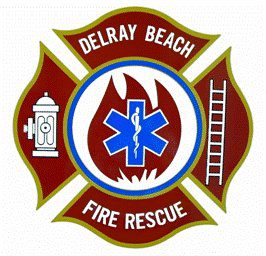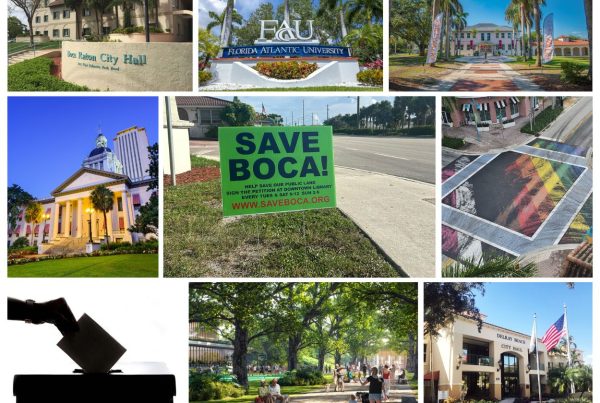Fire rescue Delray
Delray Beach city commissioners weren’t going to discuss fire-rescue services at tonight’s meeting.
Now, they are.
The issue of contracting with Palm Beach County rather than the city continuing with its own department has been around for almost a year and a half. The commission rejected the idea in June 2014, primarily because of doubts that projected early savings would continue.
Still, the key long-range financial problem for Delray Beach remains police and fire pension costs. The city addressed half of the problem a year ago in a three-year police contract that contains pension savings. The goal was to do the same with the International Association of Firefighters, but the budget year ended on Sept. 30 without a new agreement. Though the city has not declared an impasse, the firefighters are working without a contract.
City Manager Don Cooper started work after the commission rejected the county’s 2014 offer. Mayor Cary Glickstein said the commission had asked Cooper to keep talking with county officials. Cooper had been doing that. Last week, however, Cooper told the commission that the city should end those talks.
In an email, Glickstein called Cooper’s decision “premature.” At last week’s goal-setting session, the mayor “suggested” that Cooper discuss the topic tonight during the manager’s report so that the commission can “provide direction to move on (forget the idea of contracting) or continue talking.”
Glickstein said one irritant for Cooper has been the county’s “delayed response” to providing a proposal. The changeover would have started on Oct. 1 of next year, which Glickstein said would have been problematic because early property tax notices go out in December. If Delray Beach contracted with the county, the city’s tax rate would go down, but property owners would pay a new, separate tax for fire-rescue. One question is how those two tax rates would match up.
Adding to the pressure is that city staff also would have to analyze the county’s offer and explain whether switching would make financial sense. Glickstein said Cooper didn’t want to present “a rushed analysis of this magnitude.”
Under its most recent proposal, the county would buy Delray Beach’s five fire stations for $8.1 million and make what the city agrees are needed upgrades, especially to the station on Linton Boulevard. The county would pay the city $3.2 million a year for five years, the duration of the agreement. The county would agree to hire 148 firefighters, the city’s current force.
But there are many other questions. Firefighters could stay with the city’s pension plan or move to the county’s. How would that affect pension savings? Delray Beach provides fire-rescue service to Highland Beach and Gulf Stream. How would the loss of that revenue be figured into the city’s overall cost? Would the deal ensure that Delray Beach could get relief if service suffers? If the city keeps its department, how much would improvements cost?
Underlying the debate is that unresolved contract. Five months ago, Union Local President Ricardo Grau wrote a letter to Cooper in which Grau blamed the city for creating a “dire and unsafe situation” regarding fire-rescue services. Grau claimed that the department lacked sufficient equipment and had to borrow from Boca Raton. Grau said Fire Chief Danielle O’Connor “shares our concerns.” Cooper said any equipment/staffing issues are “solvable.”
In an email, Cooper said that while he won’t be able to present a “side-by-side comparison,” the staff “can make some broad comparisons.” He will ask the commission to tell him “whether or not they wish me to continue the discussions” with the county.
Normally, the manager’s report comes at the end of the meeting. Commissioner Shelly Petrolia would like Cooper to speak on fire-rescue early, in case not all attendees can stay late. “This is a passionately hot topic,” Petrolia said.
It’s also a crucial topic. The county’s fire-rescue department already services nearly half of the cities. Getting a city as large as Delray Beach would help make the argument that fire-rescue should be countywide.
Contracting out, however, means that Delray Beach would relinquish control. Despite that five-year timeline, the decision likely would be irreversible. How much would it cost for the city to buy back the stations.
As with video review in the National Football League, the numbers would have to offer overwhelming evidence for the switch.
Lynn donation to FAU
Florida Atlantic University plans a “gift announcement” this afternoon at a reception for Christine Lynn. She’s been a big FAU donor—$10 million to the nursing school—even though her name is on the private university across Interstate 95.
It’s been a busy time for her. Two weeks ago, Lynn University announced a $15 million challenge grant from Ms. Lynn toward a multi-purpose student union. It is the missing element from the master plan the university drew up nearly a decade ago.
PBS news
It’s been a busy time for public broadcasting in South Florida, and much of the news is good.
For years, public radio fans in southern Palm Beach County could listen to WXEL-90.7 FM or WLRN-91.3 FM. Boynton Beach-based WXEL was the local station, but the signal from Miami-based WLRN sometimes reached as far as Boynton Beach. Often, the programming also was better.
But in 2011, Barry University sold the 90.7 license to Classical South Florida, which replaced National Public Radio programming with classical music. The company broadcast NPR on a weak signal from West Palm Beach—101.9 FM. WXEL became WPMI. Those who couldn’t get WLRN were out of luck.
Then another company bought Classical South Florida, with plans to eliminate classic music on 90-7 and NPR on 101.9 FM. Fortunately, WLRN has struck a deal to broadcast on 101.9. Station manager John Labonia made it happen, with help from Palm Beach accountant Richard Rampell, who serves on NPR’s national foundation board.
Now, though, Rampell is leading an effort to buy the 90.7 license and have the station operate under an independent board. He believes that it would take roughly $4 million. In an email, Rampell told me that one donor has pledged $500,000, and other pledges range between $5,000 and $25,000. “Still a long way from what we need.”
Getting the license, Rampell said, would mean “better coverage in the western, southern and northern parts of the county.” That antenna for 101.9 is atop the Trump Plaza condo tower on Flagler Drive in West Palm and has just a 10-mile radius. Half the signal goes out over the ocean.
NPR’s audience tends to be more affluent and more educated, characteristics of the Boca-Delray market. When I worked at The Palm Beach Post, public broadcasting was a regular reader favorite.
So it’s good to hear also that public TV stations WXEL-FM and WPBT-Channel 2 have completed their merger. WXEL, which once shared ownership with the radio station, was created in the early 1980s with the idea of having a station with more Palm Beach County content. As some predicted, however, a single, Miami-based entity made more sense. WXEL has struggled for much of its existence, and should now be stronger.
Redrawing the map
This is the final week of the Florida Legislature’s special session to produce a new state Senate map. The 2012 version violated new constitutional requirements that the map not favor a party or incumbents.
Four senators represent Palm Beach County: Republican Joe Negron and Democrats Joe Abruzzo, Jeff Clemens and Maria Sachs. Last week, the Senate approved a map that removes Negron from the county. The map from the plaintiffs who brought the successful lawsuit keeps part of Negron’s district in the county. The House must act on the map this week.
Negron’s district takes in just a northern portion of the county—Negron lives in Stuart—but leaders across the county want Negron in the legislative delegation. He may be Senate president in 2017-18. Even Democrats would want the county to have a friend like that in Tallahassee.
Atlantic Crossing lawsuit update
The Delray Beach City Commission holds another executive session this afternoon on the Atlantic Crossing lawsuit. Don’t expect a settlement to emerge.
With luck, however, negotiations between the city and the developer soon will produce a way to start talking about a settlement. It would be quicker and cheaper than a trial.








